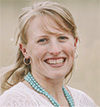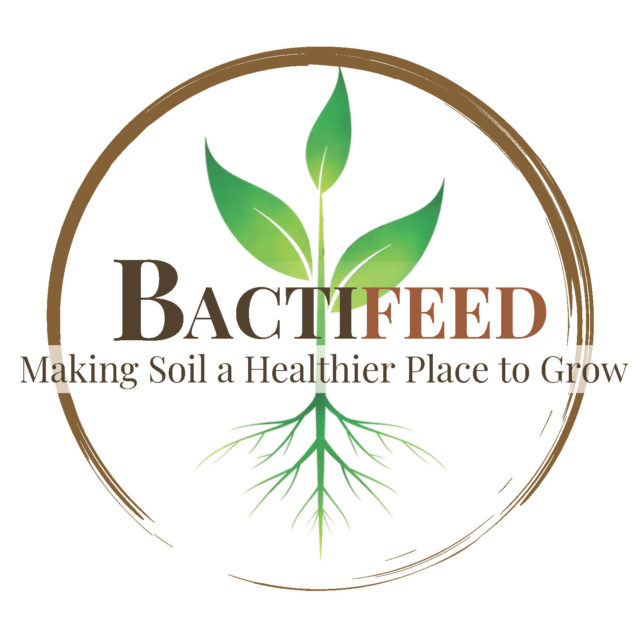Life in the agricultural community means many things to many people.
For Josh and Kimberly Parker of Parker Forage LLC, it means nomadic summers following alfalfa and corn silage harvest across the northern Great Plains with their family.
Both Josh and Kimberly grew up in dairy families in Minnesota, so long hours and hard work run in their blood. They embarked on their own custom forage harvesting business in 2009.
Two crops, two seasons
The Parkers’ season begins with alfalfa haylage harvest in Holyoke, Colorado, in late April or early May. “When going full-bore, we’re using 12 to 14 people,” says Josh. For the first cutting of alfalfa haylage, the Parkers harvest about 12,000 acres in about 15 days. Each subsequent cutting takes a little less time as the landowner tries to bale as much dry hay as possible. In 2019, the Parkers’ crew put up 55,000 tons of haylage over the course of four cuttings.
 The Parker Forage crew puts up alfalfa haylage. Photo by Heidi Parker.
The Parker Forage crew puts up alfalfa haylage. Photo by Heidi Parker.For Josh, who went to tech school to be a diesel mechanic, keeping the equipment running smoothly is both a highlight of the job and a daily chore. He starts the day as the first one to the field so he can look over the equipment, address any issues and let the crew know when the crop will be the right moisture to harvest.
After finishing alfalfa harvest, the crew splits up for corn silage. Each of the three choppers and its associated equipment tackles different jobs as they move northeast, ending the season in Minnesota in October.
“It’s a juggling act,” Josh says, of scheduling clients in Colorado, Nebraska, South Dakota, North Dakota and Minnesota. Among the first scheduled are those farmers they’ve chopped for since they started. But not all their time is necessarily planned when they leave Colorado. “We can sometimes stop and add a new client or help another custom guy out.”
Ensuring quality
Sometimes Parker Forage loses clients, when they (or their neighbors) purchase their own harvesting equipment in an attempt to diversify their operations. One of the biggest advantages they give up is speed. “We have the labor, and we will put it up correctly,” Josh says. As forage quality can depreciate over time, this is about more than just risk or time management.
 As alfalfa chopping ends and corn silage season opens, the crews split into two teams to finish the season. Photo by Heidi Parker.
As alfalfa chopping ends and corn silage season opens, the crews split into two teams to finish the season. Photo by Heidi Parker.To help maximize forage quality, the Parker crew moisture tests samples every half-hour to hour while harvesting. Samples are dried in a microwave, and the wet and dry weights are used to calculate percent dry matter.
Last year, for the first time, Parker Forage used a HarvestLab-outfitted chopper for corn silage. This tool provides moisture, yield, acid detergent fiber (ADF) and neutral detergent fiber (NDF) estimates as the chopper harvests. Compared with field moisture tests and follow-up forage quality tests, “it was really accurate for corn silage,” Josh says. “We’ll see how things go for the first cutting of alfalfa [in 2020].”
Family life
Traveling with their mom and dad is a way of life for the five Parker kids, who are used to making a 42-foot camper their home through alfalfa and corn silage harvest. Early in 2020, however, the Parkers relocated from Osakis, Minnesota, to Holyoke, Colorado. They are looking forward to completing alfalfa harvest from their new home base before hitting the road again for corn silage this year.
 The Parker kids are all smiles next to a John Deere 9900 chopper. Photo by Heidi Parker.
The Parker kids are all smiles next to a John Deere 9900 chopper. Photo by Heidi Parker.Homeschooling gives the Parkers the unique ability to involve the kids in the lifestyle and the family operation without missing out on learning. “We believe in raising them with real-life experiences,” says Kimberly. At age 8, the Parkers’ oldest son is now learning to drive tractor – and he’s becoming quite a hand. “He’ll be our merger driver this year,” his mom says with pride.
But life on-the-go isn’t all work, either. “We sightsee on rainy days when we’re not fixing,” says Kimberly. “And the kids have friends in all sorts of states.”
Hiring a crew
One of the challenges Parker Forage has faced has been finding good help. “We couldn’t find quality, reliable people willing to travel,” says Josh. The struggle was intensified by the seasonal nature of the work and the driving requirement. Two years ago, the Parkers decided to apply for out-of-country workers through the H-2A program.
This program grants visas to non-immigrant workers for temporary agricultural work. Parker Forage must provide housing while their employees are in the U.S., cover administrative fee costs and keep careful records. In return, they have been able to host Mexican workers with six-month visas for two years now.
“We were very nervous,” says Josh about getting started, “because neither one of us knows Spanish very well.” Although the language barrier has been a challenge, enough of their crew members have spoken sufficient English to make clear communication possible.
 Harvesting is a family affair for the Parkers. Photo by Heidi Parker.
Harvesting is a family affair for the Parkers. Photo by Heidi Parker.Both Josh and Kimberly have good things to say about both their employees and their overall experience with the program so far. “They’re quality, respectful guys,” says Kimberly, who notes her appreciation for how the men have treated her and the kids.
“Every one of the guys we’ve had has a family,” says Josh. “Their goal is to work hard and make money to send home.” Their work ethic and motivation to get the job done makes them fit right in at Parker Forage.
A business and a lifestyle
One mark of Parker Forage’s success can be seen in their growth from one chopper and three straight trucks a decade ago, to operating three choppers, three mergers, and the associated equipment today. “You have to choose to grow or stay where you’re at,” says Kimberly.
But like many of their agricultural counterparts, it’s clear that Josh and Kimberly measure success with more than a balance sheet. “I love getting to have my kids and wife around,” says Josh. Whether making silage or enjoying well-deserved time off, the Parkers always operate as a family.











